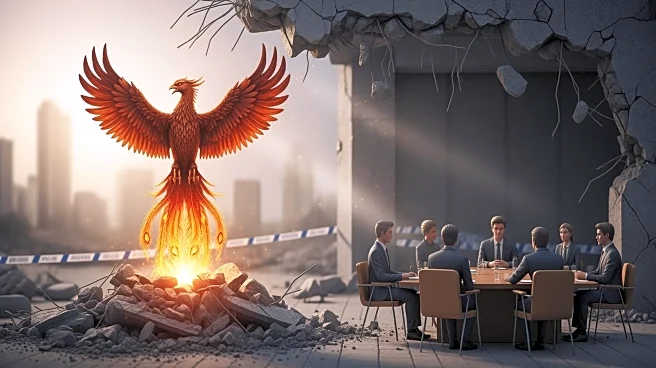What's Happening?
The United Nations Development Programme (UNDP) is actively engaged in clearing debris and rebuilding infrastructure in Gaza following extensive damage from recent conflicts. Jaco Cilliers, the special representative of the administrator for the UN's
Program of Assistance to the Palestinian People, is leading the project. The scale of destruction is immense, with virtually no building left undamaged. The UNDP has already cleared 3,100 truckloads of rubble, which is being sorted and recycled for future use in construction. Challenges include unexploded ordnances within the debris and restrictions on construction materials entering Gaza. Basic utilities such as electricity, water, and waste management are severely disrupted, posing significant health and environmental risks.
Why It's Important?
The reconstruction efforts in Gaza are crucial for restoring normalcy and improving living conditions for its residents. The UNDP's work is vital in addressing immediate humanitarian needs and laying the groundwork for long-term recovery. The initiative also highlights the ongoing challenges faced due to restrictions on materials and equipment, which hinder rebuilding efforts. The presence of unexploded ordnances adds a layer of complexity and danger to the process. Successful reconstruction could lead to improved infrastructure and services, potentially stabilizing the region and reducing future conflict risks.
What's Next?
The UNDP will continue its efforts to clear rubble and rebuild essential infrastructure, while navigating restrictions on materials and equipment. International cooperation and funding will be critical to support these efforts. The situation requires ongoing attention to ensure that basic utilities are restored and that health risks are mitigated. The broader international community may need to engage in diplomatic efforts to ease restrictions and facilitate the entry of necessary resources into Gaza.
Beyond the Headlines
The reconstruction of Gaza is not only a logistical challenge but also a politically sensitive issue. The restrictions on materials and equipment reflect broader geopolitical tensions that impact humanitarian efforts. The presence of unexploded ordnances underscores the dangers faced by civilians and aid workers alike. The rebuilding process could serve as a catalyst for renewed dialogue and cooperation between conflicting parties, potentially paving the way for more sustainable peace initiatives.















